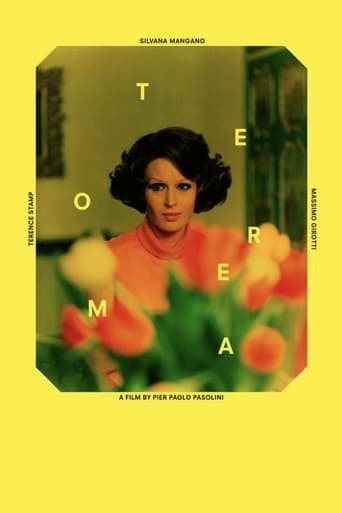eldiran-24234
As always with Pasolini, we get clumsy acting, dialogue and camera work, though here the story is so important and vital that I've given it more stars than it aesthetically deserves. A stranger appears within a wealthy Italian family, is seduced/seduces each of them--old and young, women and men--and they are all changed by his (its) presence. Though Terence Stamp is perfect physically for the androgynous/bisexual angel, he is a bit adrift among Pasolini's amateurish melodramatic and kitschy handling of film-making. I recommend it ONLY for the brave and rare portrayal of Connection/Love as genderless
Dario Vaccaro
Only Pasolini could've filmed something of this kind. No-one else is this crazy. Almost fifty years after its release, the interpretation of the film has been almost settled: the visitor is God or some other superhuman entity, the obsession the family members develop is the taste of the unknown and their final mental breakdown is the inability of the bourgeois to live authentic feelings and to break their own limits. Supporting this interpretation is Emilia's fate, who unlike her masters goes back to her birthplace and is changed in better, almost to a God-like state.Sure, this film is not for everyone, least of all for people who know nothing about the context of Pasolini's beliefs and Italian society. But when you get them, you see a masterpiece of artistry, which is so much so that it loses itself in its mystery and gives little to the watcher to take home. What I mean is that, like many successful attempts at genius, "Teorema" lacks any emotional response by its viewers and any response at all by non intellectuals. It is regardless a milestone in Italian cinema and an incredible showcase of dream-like artistry.
lreynaert
A lot of ink has already flown over the apparently enigmatic movie 'Teorema' shot by Pier Paolo Pasolini. Hereafter my own interpretation in the light of his whole work.Pier Paolo Pasolini's curse As he explained in his book 'Amado Mio – Atti Impuri', P.P. Pasolini's lifelong curse was the sexual attraction of ephebes. This curse was a Christian one. Homosexual relations between an older man and an adolescent were considered to be totally natural in ancient times (Sparta, Marcus Aurelius, Theocritus) before Christianity became the dominant, totalitarian religion, with its morality holding on that procreation was the only goal of sexual intercourse. The Christian Churches considered also that the family nucleus was the best means to propagate its own religious faith from the parents to the children.This curse was also a bourgeois one. Promiscuity was rampant among the majority of the population (the lower classes which possessed nothing) and the nobility (except for the legal spouses, because within the ruling classes the fatherhood had to be assured). The bourgeois class crept out of the mud of the lower classes and adopted the family policy of the Christian Churches. The wealth gathered by lifelong hard toiling had to be preserved within the family. For those whose sexual (promiscuous) drive was too strong, there were the brothels exploited by the Churches (E.J. Burford).Pasolini's gospel: free sexuality 'Teorema' is a plea for free sexuality, personified in the main character of the movie played by Terence Stamp. He has sexual intercourse with everybody: young and old, male and female, the lower and the middle classes. This free sexuality shatters the family nucleus and shakes fundamentally the behavior of its members. It fully undermines the Christian bourgeois morality, which stands in the way of people wanting to live fully their own sexuality. But, before it can be implemented, a community has to go through the desert. P. P. Pasolini didn't foresee that between the 1960s and now, the Christian and the bourgeois mentality and morality would nearly totally disappear. People now can change partners as easy as they can change their shirts. Only children are legally protected. In 'Comizi d'amore' (1964) Pier Paolo Pasolini was openly insulted to be a disgusting individual (by people who didn't know his sexual preference).And what about Pasolini's communism? In the beginning of the movie, an entrepreneur gives his plant freely away to his workforce. But, one of the workers says that this is not enough: one should also get rid of bourgeois morals. One should not forget that after the Bolshevik revolution in the USSR 'free love associations' became a norm (not for long) under the advocacy of Alexandra Kollontai.Although sexual morals have substantially changed since the shooting of this movie, its bold treatment of human sexuality is still unsettling. Not to be missed.
Bene Cumb
For me, Italian and Swedish artistic films have a lot in common, beginning with static scripts and ending with poker-faced performers. Usually are Pasolini's films different from this pattern, but not with Teorema where the above mentioned features are fully visible. Of course, directing and camera work are great and the actors-actresses are at least good, if not more, but I am not very much into profundity connected with religion and sexuality. And boredom among the rich, long dialogs with literary connections, background classical or church music - all this has been used before and after Pasolini. And those endless scenes without any text… Well, the ending was also not according to my taste.Luckily, the film is only 1,5 hours, but I could recommend it only for selective , like-minded audience.



